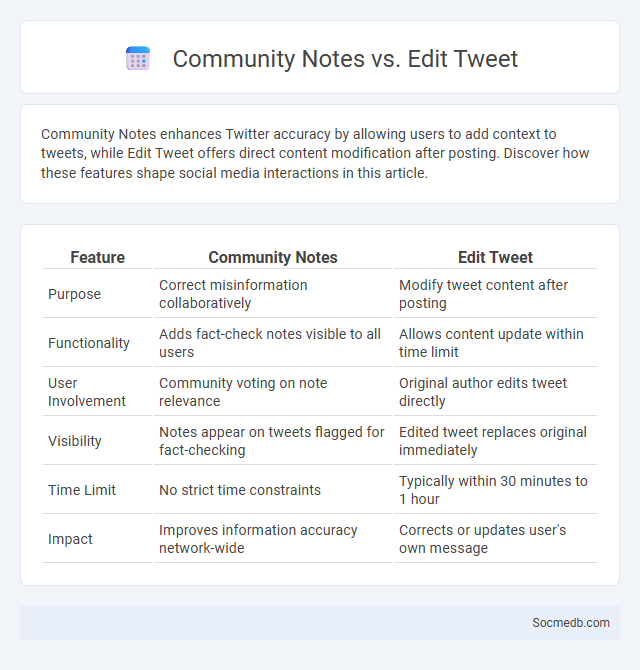
Photo illustration: Community Notes vs Edit Tweet
Community Notes enhances Twitter accuracy by allowing users to add context to tweets, while Edit Tweet offers direct content modification after posting. Discover how these features shape social media interactions in this article.
Table of Comparison
| Feature | Community Notes | Edit Tweet |
|---|---|---|
| Purpose | Correct misinformation collaboratively | Modify tweet content after posting |
| Functionality | Adds fact-check notes visible to all users | Allows content update within time limit |
| User Involvement | Community voting on note relevance | Original author edits tweet directly |
| Visibility | Notes appear on tweets flagged for fact-checking | Edited tweet replaces original immediately |
| Time Limit | No strict time constraints | Typically within 30 minutes to 1 hour |
| Impact | Improves information accuracy network-wide | Corrects or updates user's own message |
Introduction: Understanding Twitter’s Collaborative Features
Twitter's collaborative features enable real-time interaction and collective content creation, enhancing user engagement through retweets, threads, and shared polls. These tools foster dynamic conversations, allowing users to amplify messages and build communities around shared interests. Leveraging hashtags and mentions further streamlines collaboration by connecting diverse audiences and facilitating information discovery within the platform.
What Are Community Notes?
Community Notes are a collaborative fact-checking feature on social media platforms designed to provide context and reduce misinformation in tweets or posts. Contributors from diverse backgrounds add notes that offer additional insights or corrections, which are then rated by the community to ensure accuracy and relevance. This crowdsourced approach enhances content transparency and promotes informed discussions by highlighting credible information.
How Does Edit Tweet Work?
Editing a tweet involves modifying the original content after it has been posted, allowing users to correct typos, update information, or clarify messages. Platforms like Twitter enable this feature by saving an editable draft or providing an "Edit Tweet" button that tracks changes and timestamps to maintain transparency. This functionality enhances user experience by ensuring accuracy while preserving interaction history and engagement metrics.
Key Differences: Community Notes vs Edit Tweet
Social media platforms utilize Community Notes to crowdsource fact-checking, allowing users to provide context and corrections on misleading tweets, whereas Edit Tweet features enable users to revise their original posts directly, correcting errors or updating information swiftly. Community Notes rely on collective input and transparency to enhance content credibility, while Edit Tweet prioritizes user autonomy in managing personal content accuracy. Your choice depends on whether you seek collaborative verification or immediate personal content control.
User Contribution: Who Can Participate?
Social media platforms empower diverse user contributions from individuals, businesses, influencers, and organizations across the globe. Participation is open to anyone with internet access, enabling content creation, sharing, commenting, and engagement in various formats such as text, images, videos, and live streams. User-generated content drives platform growth, fosters community interaction, and enhances personalized digital experiences.
Accuracy and Trust: Ensuring Information Integrity
Ensuring accuracy and trust in social media is crucial to maintaining information integrity and user confidence. Platforms implement fact-checking algorithms and user reporting systems to minimize misinformation and verify credible sources. Your vigilance in sharing verified content contributes to a more reliable and trustworthy online environment.
Impact on Social Media Discourse
Social media platforms have transformed public discourse by accelerating the spread of information and enabling diverse voices to participate in conversations globally. The algorithms prioritize engagement, often amplifying sensationalist content, which can polarize opinions and create echo chambers. Consequently, these dynamics influence social norms, political debates, and cultural trends, reshaping how information is consumed and shared.
Limitations and Challenges
Social media platforms face significant limitations including data privacy concerns, algorithmic biases, and the spread of misinformation. Users often struggle with maintaining digital well-being due to addictive features and echo chambers that reinforce polarizing content. Regulatory challenges and the need for transparent content moderation policies further complicate the landscape for both users and platform providers.
Use Cases: When to Use Community Notes or Edit Tweet
Community Notes are ideal for correcting misinformation or adding context to viral tweets that impact public perception, enhancing transparency and accuracy. Edit Tweet should be used immediately after posting to fix minor errors such as typos or unclear phrasing without altering the original meaning. Leveraging these tools improves user engagement by fostering trust and clarity within social media interactions.
Future of Collaboration on Twitter
The future of collaboration on Twitter revolves around enhanced real-time communication tools and integrated workflow features, enabling seamless interaction among professionals and communities. Innovations like Spaces for live audio discussions and collaborative tweet threads foster dynamic teamwork and knowledge sharing across diverse networks. Twitter's evolving API improvements also support third-party app integrations, expanding opportunities for cross-platform collaboration and productivity.
 socmedb.com
socmedb.com